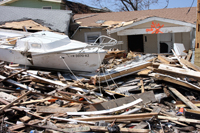Archived Content
The National Institute of Mental Health archives materials that are over 4 years old and no longer being updated. The content on this page is provided for historical reference purposes only and may not reflect current knowledge or information.
Consortium Moves Quickly to Study Resilience Following Hurricane Ike
• Science Update

FEMA News Photo
A consortium of research programs funded by NIMH to conduct post-disaster mental health research mobilized this year following hurricane Ike to study the factors that influence resilience after disasters.
BackgroundWeathering the emotional shocks of disasters can have long-term mental health consequences for those who have experienced these events. Post-disaster research can provide insight into what helps people cope in traumatic situations and what services can best support their ability to adapt and rebound. However, in the destruction and chaos following disasters, it is difficult enough to provide assistance, let alone marshal the resources to conduct research. As a response to the need for timely, systematic post- disaster research, in September 2007 NIMH funded a National Center for Disaster Mental Health Research (NCDMHR), comprised of investigators from different academic research centers. One goal of the program was to enlist multi-disciplinary expertise; another important aspect was to have these capacities in place for quick mobilization when disaster occurred.
This StudyWhen hurricane Ike struck Texas in early September 2008, the NCDMHR set in motion its protocol for a study of mental health in the aftermath of the storm. Epidemiologic studies will look at the psychological wellness of participants over time, and the factors that help determine how they fare; these include socioeconomic status, level of trauma, post-disaster stresses and resources, and biologic factors, including genetic differences and stress hormone levels. Research on services will provide information on post-disaster mental health care needs, and will include trials of a brief Internet-based intervention and cognitive behavioral therapy for people experiencing post-disaster distress.
SignificanceThe long-term objective of this effort is to understand the factors that play into resilience—the adaptive capacities that people draw on during adversity—and how to promote resilience. The ability to move quickly, establish in advance protocols for obtaining desired information, conduct longitudinal research on large population samples, and enlist expertise from multiple disciplines will help the Center provide an evidence base for designing effective mental health services for communities affected by future disasters.
This work will also help clarify why some people develop lasting post-traumatic stress disorder—an anxiety disorder that can be triggered by traumatic events—or depression following disasters, while others experience more transient distress, but go on to recover.
What's NextThe NCDMHR plans to interview participants in post-disaster studies three times: at 2, 4, and 14 months post-disaster. Over time, the Center also plans to expand its efforts to include studies focused on children and older adults, and cross-cultural research.
National Center for Disaster Mental Health Research Sites
Dartmouth Medical SchoolLebanon, NH
University of Michigan School of Public Health
Ann Arbor, MI
Medical University of South Carolina
Charleston, SC
Yale University School of Medicine
New Haven, CT
University of Oklahoma Health Sciences Center
Oklahoma City, OK
University of Texas Southwestern Medical Center
Dallas, TX
